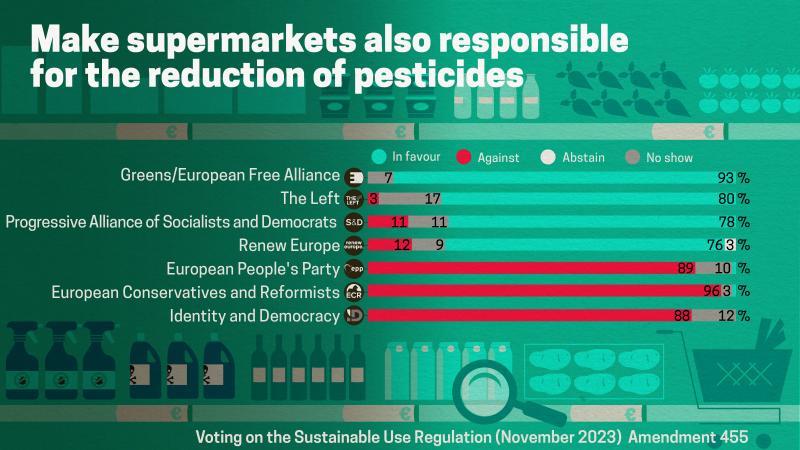Stay always informed
Interested in our articles? Get the latest information and analysis straight to your email. Sign up for our newsletter.

Brussels, 04 June 2024 - Today a farmers protest is taking place in Brussels, under the Atomium. Its organisation was discussed at a meeting by an Orban-linked Hungarian think tank in January, with attendance of several far-right parties. The speakers list for today is dominated by the far-right as well. Turn-out numbers however are far lower than previous protests.
Previous protests were a reaction to the lack of fair income and livelihood security for farmers. In the middle of a cost-of-living crisis created by high prices and high inflation, agricultural incomes have fallen to 47% of average gross wages in the EU. In the last 15 years, over 5 million farms have disappeared in the EU, and this trend continues.
But instead of taking measures for a fair income, EU Commission President Ursula Von Der Leyen, backed by her EPP group, chose to derail the EU's green agenda as a way to respond. This is precisely what the lobbying campaign led by agribusiness lobbyists from Copa-Cogeca and its members and pesticide industry lobby group CropLife Europe aimed to achieve.
The EPP has always supported the unfair distribution of agricultural subsidies and the global neoliberal free trade agenda that farmers are now opposing.
Far-right parties are now trying to cash in on farmers' anger. Earlier this year, far-right think tanks such as the Hungarian Government-funded MCC Brussels aimed to frame the protests into a right-wing narrative focused solely on attacking the EU Green Deal and any environmental or health protection.
This protest was initiated at a meeting convened in Brussels in January by MCC Brussels. Yet, the Órban regime has led to former state farms ending up in the hands of Hungarian oligarchs, who have become the main recipients of CAP money in Hungary. It has also promoted a rural policy against farmers and towards the concentration of property.
According to Nina Holland, researcher and campaigner at CEO: "Today's protest, the speakers' list is dominated by far-right or ultra-nationalist parties. In countries where the far right is already in power, such as Hungary or Italy, they are failing farmers with the same bad policies that serve neither farmers nor the environment."
Speaker Lola Guzmán from Spain is an ex-Vox militant and big landowner who leads the Spanish plataforma 6F. The extreme-right party Vox, while presenting itself as anti-globalist and defender of small farmers, tried to capture the farmers' protests that happened in Spain.
However, Vox, at the same time, works closely with extreme pro-free trade think tanks. These advocate against any health or environmental measures, and for a completely liberalised agricultural market. This would be the death knell for European farmers. As shown by the Spanish media La Sexta, Vox runs various regional agricultural ministries in Spain, yet opportunistically supported the farmers' protests, whilst continuing the same policies from previous governments.
Wybren van Haga heads the Dutch ultranationalist party Belang van Nederland, which has an election programme that calls for the Netherlands to leave the Paris Climate Agreement and for an end to EU bans on pesticides. Farmers are the first to suffer the consequences of the climate crisis and the health risks from using pesticides.
Tom Vandendriessche, Belgian MEP from the flemish far-right party Vlaams Belang, who is known for spreading racist and untrue allegations about migration, also does not have a voting record supporting farmers. At the last CAP reform, he voted against many proposals that could have helped farmers: against promoting local supply chains, against unfair trading practices by supermarkets, against support to farmers to reduce pesticides, and even against measures to combat fraud with farm subsidies by corporations (following the case of Agrofert, owned by Czech prime minister Babis).
The nationalist MEP Rob Roos has voted against any measure to reduce pesticides. He even voted against an amendment aiming to share the responsibility for pesticide reduction fairly among the food chain. This means that supermarkets would have to do their bit instead of just the farmers.
Last month's summit of far-right parties held in Madrid, convened by Vox, was a clear demonstration of how far-right parties claim to be 'anti-globalist' but, in reality, collaborate closely with ultra-free trade think tanks of the Heritage Foundation who strongly back free trade agreements such as EU-Mercosur. At the same event, Vox leader Abascal appeared alongside Robert Severino of the Heritage Foundation (part of Atlas Network of think tanks), which helped shape the global free trade agenda and corporate globalisation. Another member of the Atlas Network, ECIPE, is strongly defending free trade agreements, including EU-Mercosur. One of its former employees, Emily Rees, is now Director of CropLife International, the global branch of the pesticide industry lobby.
Both the EPP and far-right parties are trying to gain the "rural vote." However, neither will really protect the livelihoods and well-being of most farmers. Seeing the low turnout, a coalition of EPP, far-right, big agribusiness, and their lobbyists may, in fact, be short-lived in manipulating farmers' just demands.
The opportunistic dismantling of the European Green Deal was a step back that needs to be overcome, with politics that defend all communities and the environment, creating true alternatives for the future.
João Camargo, campaigner and researcher at CEO, comments: "The situation that led to these protests has not passed and will aggravate in the upcoming years. The highly intensive agricultural model is simply impossible to maintain. The social and environmental crisis we are currently in will demand a true response."
ENDS
For media inquiries, please contact:
Joao Camargo - joao@corporateeurope.org +351 963367363
Nina Holland - nina@corporateeurope.org +32 466294420